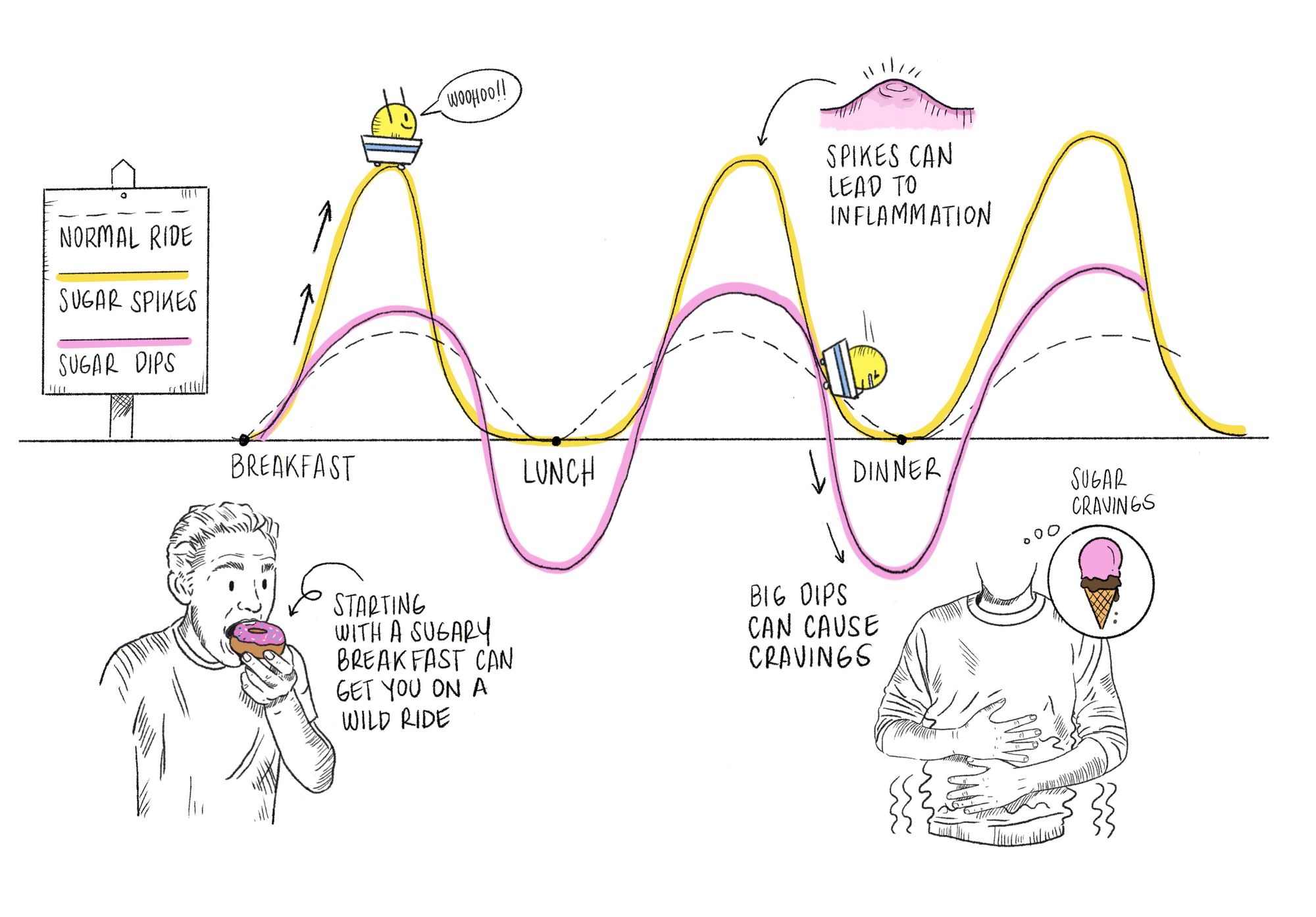12 Effective Ways to Prevent Blood Sugar Spikes

Blood sugar spikes can have detrimental effects on your health, leading to lethargy, hunger, and long-term complications like type 2 diabetes, heart disease, and stroke. Fortunately, there are several simple and effective strategies you can incorporate into your lifestyle to prevent blood sugar spikes.

In today's blog post, I will explore 12 proven methods to help you maintain stable blood sugar levels and promote overall well-being.
- Go low-carb: Consuming a low-carb diet has been shown to prevent blood sugar spikes. When you eat carbs, they are broken down into simple sugars, causing your blood sugar levels to rise. A low-carb diet not only helps in stabilizing blood sugar but also aids in weight loss, which further reduces the risk of spikes.
- Eat fewer refined carbs: Refined carbs, such as table sugar, white bread, and soda, have a high glycemic index and quickly raise blood sugar levels. Opt for whole-grain foods, fruits, vegetables, and legumes, which have a lower glycemic index and provide essential nutrients, fiber, and antioxidants.
- Reduce your sugar intake: Added sugars, like sucrose, offer empty calories and lead to immediate blood sugar spikes. Limit your consumption of sugary processed foods and drinks, and be mindful of food labels to track your sugar intake. Consider using sugar substitutes as an alternative.
- Maintain a healthy weight: Being overweight or obese makes it harder for your body to control blood sugar levels, increasing the risk of spikes and type 2 diabetes. Focus on achieving and maintaining a healthy weight through a balanced diet and regular exercise, as even modest weight loss can significantly improve blood sugar control.
- Exercise regularly: Physical activity increases insulin sensitivity and helps cells absorb sugar from the blood, leading to lower blood sugar levels. Engage in both moderate and high-intensity exercises to prevent spikes and promote weight loss, which further aids in blood sugar control.
- Increase fiber intake: Fiber slows down the absorption of carbs and sugar into the bloodstream, resulting in steadier blood sugar levels. Include fiber-rich foods like oatmeal, nuts, legumes, fruits, and vegetables in your diet. Besides regulating blood sugar, fiber also promotes satiety, reducing appetite and aiding in weight management.
- Stay hydrated: Proper hydration is crucial for blood sugar control. When dehydrated, your body releases vasopressin, a hormone that retains fluid and causes the liver to release more sugar into the blood. Drink an adequate amount of water throughout the day to prevent dehydration-related spikes. Avoid sugary juices and sodas as they can cause blood sugar imbalances.
- Incorporate vinegar into your diet: Vinegar, particularly apple cider vinegar, has been linked to improved insulin response and reduced blood sugar spikes. Add vinegar to your meals or consume it before a carb-rich meal to help control blood sugar levels. Vinegar also lowers the glycemic index of foods, further aiding in preventing spikes.
- Ensure sufficient intake of chromium and magnesium: Both chromium and magnesium play a role in blood sugar control. Chromium enhances insulin action, while magnesium improves insulin sensitivity. Include food sources rich in these minerals, such as broccoli, eggs, spinach, almonds, and avocados, in your diet. Supplements may also be considered after consulting with a healthcare professional.
- Spice up your meals: Cinnamon and fenugreek have been associated with blood sugar control. Cinnamon has shown promising results in increasing insulin sensitivity, while fenugreek's high soluble fiber content slows down carb digestion. Incorporate these spices into your meals or consider using supplements for added convenience.
- Explore berberine: Berberine is a natural compound found in certain herbs and has been used in traditional medicine for its potential blood sugar-lowering effects. Studies have shown that berberine can help improve insulin sensitivity, reduce glucose production in the liver, and enhance glucose uptake in cells. Consult with a healthcare professional before taking berberine supplements to determine the appropriate dosage and ensure it is safe for you.
- Practice stress management: Stress can contribute to blood sugar spikes as it triggers the release of stress hormones like cortisol, which can raise blood sugar levels. Engage in stress-reducing activities such as meditation, deep breathing exercises, yoga, or hobbies that help you relax. Getting enough sleep is also important for stress management and overall blood sugar control.
By implementing these strategies, you can effectively prevent blood sugar spikes and promote stable blood sugar levels. Remember to consult with a healthcare professional before making any significant changes to your diet or starting new supplements, especially if you have any underlying health conditions or take medications.
Taking proactive steps to maintain stable blood sugar levels can greatly improve your overall health and reduce the risk of long-term complications.